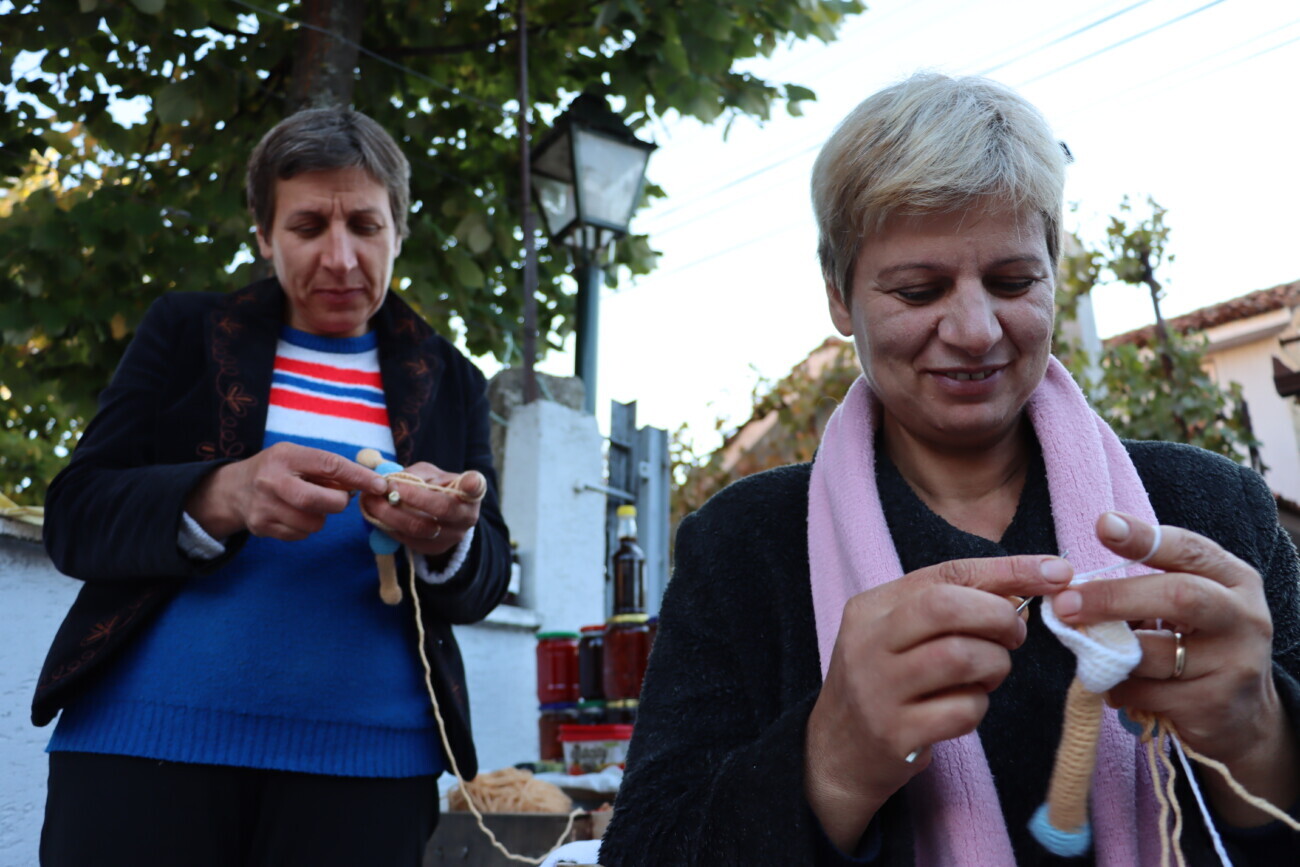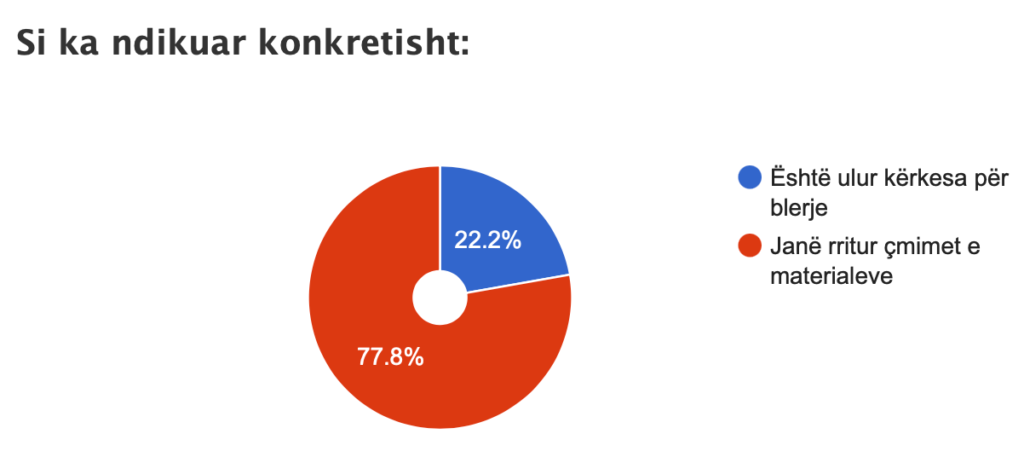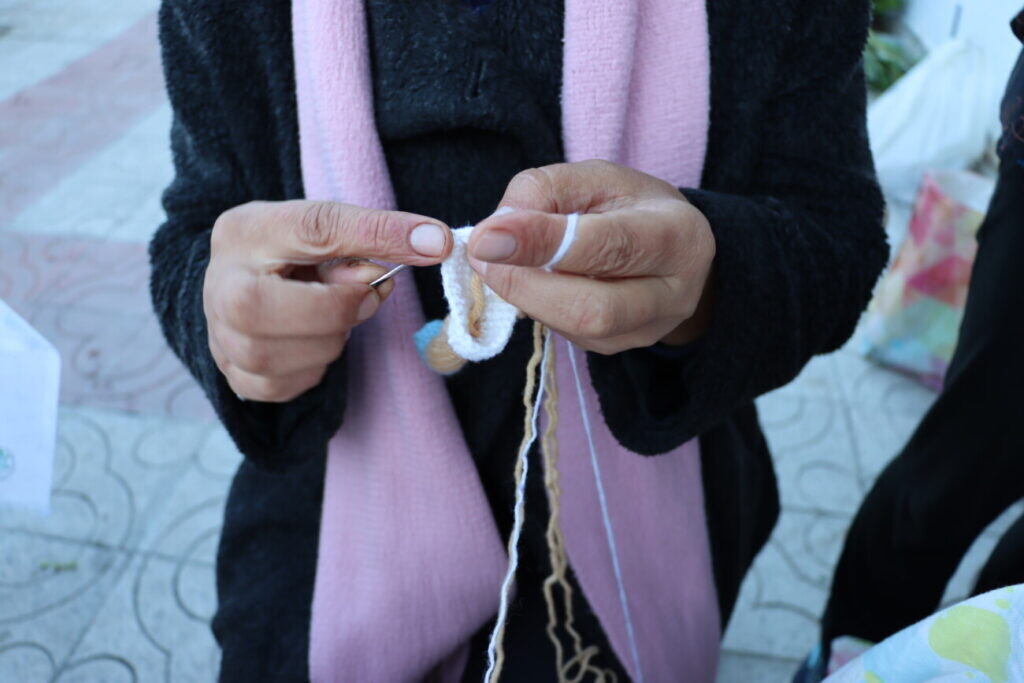Price Hikes Crisis: The Second Blow for the Masters in Albania
In Albania, it results that there are at least 500 artisans who have been voluntarily registered into the National Chamber of Crafts and hundreds more who are unregistered and are experiencing a difficult time in their businesses due to the price hikes crises and are yet to recover from the COVID-19 pandemic consequences.

Women artisans processing textiles in Tushemisht, Pogradec. Photo: Geri Emiri/ Amfora Media
Margarita Laçka has not sold a single woven basket this year even though she has made several during the last few months.
“There are no sales. During the New Year holidays I sold several baskets, however this year I have not sold a single one,” the artisan from Pogradec stated.
She and other artisans in Albania are facing several crises one after another in the last few years. Some of them have closed their businesses, while others are forced to do other things to achieve a living.
Margarita now passes a good amount of her time in the mountains of Pogradec gathering medicinal plants, nevertheless, she does not desire to give up on crafts.
“I cannot keep myself with the pension I am receiving from the death of my husband and the weaving work was not bringing me any profits, hence I was obliged to do other jobs,” she said.
According to the National Chamber of Crafts, which has created a volunteer register, in Albania there are around 500 handicrafts of various fields, divided into two categories: 154 masters and 152 apprentices.
Nevertheless, the real number of artisans is believed to be many times higher.
Amfora Media carried out a survey to learn from artisans the situation of their businesses after price hikes. It resulted that 66.7% of the interviewees were women and 72.2% of the interviewees said that the main source of their household income comes from crafts.
Price hikes: The second blow for the artisans
Initially, Albanian masters faced restrictions brought by the spread of the SARS-CoV-2 virus, considerably reducing their activity as a result of the drop in sales.
“There were months in which we sold absolutely nothing. I used the materials I had available to create baskets and the crises during the pandemic time hit me really hard,” recalled Margarita Laçka, an artisan from Pogradec for Amfora.
Artisans from Berat have also had difficulties and they continue to face issues. In Berat, the masters of the early tradition have organized themselves in the ‘Margarita’ Center.
“It began during the pandemic. It was a total blockage, from ensuring the raw materials to selling the products. It now continues with the price crisis,” analyzed Adelina Theodhori, an artisan and head of the ‘Margarita’ Artisan Center.
Artisans replying to Amfora’s survey in 72.2% of the cases said that they had felt the impact directly through “price increase of raw materials” and 22.2% through “drop in the demand and sales of their products”.

Chart legend:
What has been the impact in particular:
Blue: Drop in demand and sales of products
Red: Price increase of raw materials
The answers of the institutions, including the Ministry of Culture, revealed that artisans have not been aided during the pandemic or the price hike crisis, through financial schemes or other forms of support which would support artisans to survive the challenges that shocked the world economy.
In the answers of the 18 artisans to Amfora, price hikes forced them to reduce expenses, increase the price of products, and suspend their activity.
The representative of the artisans of Berat, Adelina Theodhori, said that artisans of that area have not profited anything at all from the government during these two crises.
“We have received nothing from the government, however thanks to donations and in cooperation with Berat Municipality, 5 artisans received 2000 euros for the strengthening of their small enterprises,” said Theodhori.
Part of the artisans has suspended TIN (Taxpayer Identification Number) in taxation authorities because as “Small Businesses” they have been unable to pay their monthly contributions to the social and health security, annual taxes, and other expenses which are necessary for the continuation of their activities.
Margarita Laçka is one of the artisans weaving with birch bark, a craft which is heading toward extinction in Albania and is nowadays considered rare. Nevertheless, she said that she cannot carry out her activity according to the taxation rules because she cannot ensure enough income to pay her taxes.
“I have my eyes on the summer. I hope that there are going to be more tourists this year, so I can sell my baskets. Nobody has supported me during these crises that we have been facing. I have received nothing,” said sorrowfully the 64-year-old woman, to whom the money generated from the sale of baskets is the main source of her household income.

The National Chamber of Crafts explained in an official response to Amfora that it has carried out a study which revealed that the activity of masters was halted and they faced many difficulties during their return to the market after the COVID-19 pandemic.
“Artisans who are also small businesses in most cases, certainly face challenges in the current conditions. During the pandemic, we carried out a study to understand the situation of businesses and reached the conclusion that most of them had stopped their activities and faced many difficulties when they returned to the market,” explained the National Chamber of Crafts.
Few schemes and little support which is far from the reality of the artisans
In Albania, in all Districts across the country, some artisans continue keeping this early profession which is as old as the origin of humanity itself. Masters, through their creations, offer products that intertwine masterfulness, art, tradition, and imagination.
The Ministry of Culture, in its official response, did not elaborate on the schemes created to cope with the COVID-19 crisis and the price hikes after the Russian aggression against Ukraine.
The Ministry brought to attention the ‘2023 Artisan Fund’, a call for projects which support and promote artisans. It ended on February 25 and it admitted applications for financial support up to ALL 1 million.

Nevertheless, artisans say that suspension or closing of TIN has caused them many problems, prohibiting them from applying in such calls, which come through state institutions or various donors.
“I was registered up to two years ago. I had a TIN, however, I was forced to close it because I could no longer pay for my insurance as I wasn’t selling anything,” said Margarita Laçka, an artisan of weaving with birch bark.
Some of the artisans questioned by Amfora declared that they were highly interested in receiving support from the Ministry of Culture’s call for 2023, however, they admitted that the closing or suspension of TIN penalized them and they were unable to conceive by themselves a real project according to the guidelines of the call.
72.2% of the artisans who responded to Amfora admitted that they carried out their craft for more than 10 years and the vast majority of them, 44.4%, were textile processers.
Some of the masters are part of communities lacking basic education and technology, similar to the ones belonging to the Roma and Egyptian communities, known among others about the weaving of birch bark, which they have inherited through the centuries.
Adelina Theodhori, representative of the masters of Berat spoke about the very small number of artisans included in the small business scheme.
“The Center has 100 artisans, however only 10 of them have been registered with a TIN, meanwhile there are around 150 artisans in Berat and its suburbs,” explained Theodhori.
The General Taxation Directorate struggled in finding real data on the number of artisans with TIN, claiming that they lacked a specific identification code.
This directorate managed to find only 25 taxpayers across Albania who had identified crafts as part of their activity.
Moreover, the Ministry of Culture did not give an exact number of artisans in Albania, however, it revealed that during the implementation of the ‘Albanian Register of Intangible Cultural Heritage’ project, among the 100 elements registered and 140 carriers contacted, around 35% of them were related to crafts.
According to the Ministry, it is the National Center of Traditional Activities that has the competence to create and update the list of artisans, however a look at the website of this authority revealed that it was out of function and according to public data, there are no figures regarding the number of artisans in Albania.

Half of the artisans responding to Amfora admitted that they had inherited their craft and 55.6% of the creations of the interviewees are purchased as ornaments.
Amfora has earlier reported about masters of stone processing in Berat or ornamental wooden ships in Durres, exposing the impact related to the lack of interest to inherit these crafts.
Among the artisans questioned lately, masters of working tools stated that the abandoning of working the land has brought a considerable drop in the demand for the purchase or repair of working tools in villages.
Even though in one case an artisan admitted that had profited from a grant from the Ministry of State for the Protection of Entrepreneurship, this authority officially responded to Amfora that artisans and their enterprises “are not part of the target and responsibilities of the ministry.”
18 artisans responding to Amofra admitted in 88.9% of the cases that their sales plummeted as a result of price surge and 94.4% of them had not been financially supported by the government or Municipality after price hikes.
They appreciated the call of the Ministry of Culture for artisans, which opened in January of this year, however, they expressed their regret that they did not fulfill the minimum criteria required.
“I, myself, cannot apply because I do not have a TIN. I asked my friends, and they had the same problem. There is a big desire to apply, however, we do not know how can we do it when we do not have a TIN,” Margarita Laçka said bitterly concluding the conversation.
“TIN is the primary condition, however, we should not forget that artisans are mostly middle and senior aged, hence they have many difficulties,” stated Adelina Theodhori, Head of the ‘Margarita’ Artisan Center in Berat concluding her description of the situation.


